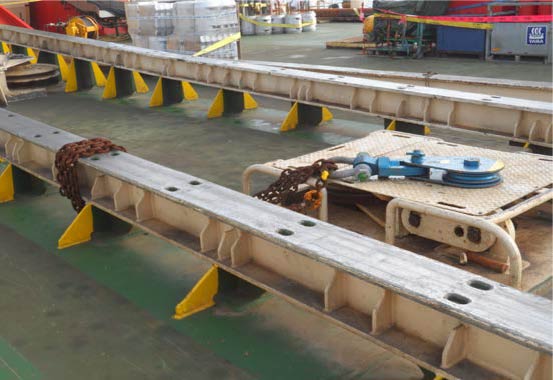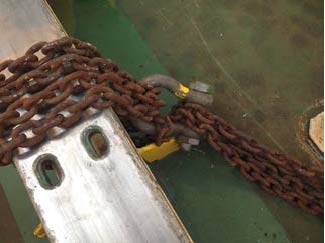Near-miss: Anchoring of rigging to uncertified points
A member has reported a near miss incident in which rigging was anchored to uncertified points. The incident occurred during pipelay operations onboard a vessel. A temporary rigging solution using chains and shackle and snatch-block was used to control the position of a winch wire. This temporary rigging arrangement was then anchored to deck rails which were not designed to take side loads. The use of deck rails or other uncertified structures as an anchorage point is hazardous.
An unapproved anchorage point had the potential to lead to injury to personnel and/or damage to the equipment. Although this rigging arrangement did not, in this case, lead to an incident, our member considered that it was bad practice which could easily have done so.


Our member’s investigation established the following:
- The deck rail was not designed to take side loading and as a result could have led to injury to personnel and/or damage to the equipment;
- The deck rail was not a certified rigging/lifting point; such lifting points are or should always be appropriately marked as such;
- The deck rail did not undergo statutory periodic thorough examinations as required by local regulatory requirement.
Our member reiterated the lessons that:
- Only certified rigging/lifting points should be used for this type of operation;
- Anchorage points should be clearly marked with the safe working load before they are considered safe to use;
- The use of existing ship structures for this type of operation should not be permitted.
Members may wish to refer to the following similar incidents (key words: uncertified, lifting):
Members should also refer to Guidelines for lifting operations.
Safety Event
Published: 16 January 2015
Download: IMCA SF 01/15
IMCA Safety Flashes
Submit a Report
IMCA Safety Flashes summarise key safety matters and incidents, allowing lessons to be more easily learnt for the benefit of all. The effectiveness of the IMCA Safety Flash system depends on Members sharing information and so avoiding repeat incidents. Please consider adding [email protected] to your internal distribution list for safety alerts or manually submitting information on incidents you consider may be relevant. All information is anonymised or sanitised, as appropriate.
IMCA’s store terms and conditions (https://www.imca-int.com/legal-notices/terms/) apply to all downloads from IMCA’s website, including this document.
IMCA makes every effort to ensure the accuracy and reliability of the data contained in the documents it publishes, but IMCA shall not be liable for any guidance and/or recommendation and/or statement herein contained. The information contained in this document does not fulfil or replace any individual’s or Member's legal, regulatory or other duties or obligations in respect of their operations. Individuals and Members remain solely responsible for the safe, lawful and proper conduct of their operations.
